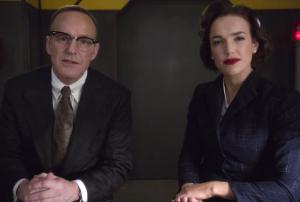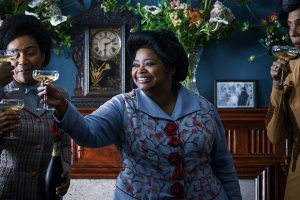SPOILERS FOR AGENTS OF S.H.I.E.L.D. AHEAD
The seventh and final season of Agents Of S.H.I.E.L.D. is suddenly delivering on everything I wanted it to: not only are the tie-ins to the Marvel Cinematic Universe abundant and cleverly constructed in the third episode, but the character work is excellent, the writing is mostly superb, and the setting – Area 51 in the 1950’s, at the pinnacle of the Space Race and America’s obsession with aliens and UFOS – is utilized wonderfully.
From the moment the title card appears, changed to fit the new historical period and accompanied by some classic eerie sci-fi music, I knew I was in for a good time. And yes, this season is still suffering from a few flaws – mainly, that the exposition is often, though not always, delivered through straight-up monologues of boring, nonsensical information that never fail to stop a dramatic scene in its tracks – but the good far outweighs the bad this week. The episode, titled Alien Commies From The Future!, leans heavily into comedy and has no problem poking a little fun at itself, or the tropes commonly associated with the 50’s. Sleek, “All-American” diners in the middle of the desert; the threat of “Stalinites”; CIA coverups. It’s all there, and it all works.

Phil Coulson (Clark Gregg) and Jemma Simmons (Elizabeth Henstridge) are, both surprisingly and unsurprisingly, the comedic MVP’s of the week – it’s surprising because they rarely ever get paired up with each other, but it’s also unsurprising because whenever they do, they have brilliant banter. Do you remember the scene on the train all the way back in season one, when they pretended to be a father and daughter on vacation? The scenes they share in this episode have shades of that hilarious interaction.
But the drama and the social commentary, though subtler, is handled surprisingly well. In particular, there’s a scene in which Coulson is rambling excitedly about all the great things happening in the 50’s, only to have his teammate Daisy Johnson (Chloe Bennet) shut him down with a gesture toward the back of the aforementioned diner, where it’s hard to miss the signs indicating segregated bathrooms. Race relations come up again later in the episode, when the Agents of S.H.I.E.L.D. capture a Department of Defense official for interrogation, only to discover he’s a nasty bigot and is more threatened by the idea of spilling secrets to a Black man than he is by the thought of betraying his country. So they send in Deke Shaw (Jeff Ward), who, after some grumbling about “stupid white privilege”, does in fact weasel information out of the prisoner. The prisoner in question is released by the end of the episode, and gets his just desserts – running, screaming, through the desert and rambling about communist aliens.

On a more personal note, there’s drama and comedy to be found in the interactions between Simmons and one Daniel Sousa (Enver Gjokaj). Simmons, in order to infiltrate Area 51 undetected, riskily disguises herself as none other than Director Of S.H.I.E.L.D. Peggy Carter, only to run into Sousa, Carter’s former work partner and post-Steve Rogers love interest. Though I would have liked to have seen Carter turn up in the flesh (and there were rumors that she would, or perhaps still could), Simmons frantically trying to keep her cool as she figures out that Sousa isn’t buying her disguise is possibly just as good a scenario. Sousa doesn’t have very much to actually do in the episode – his role is limited to following the Agents around and trying to figure out who’s working for what – but it’s nice to see him reprise the role he had on the short-lived Agent Carter series. Next week’s episode will apparently also star Sousa, as the Agents Of S.H.I.E.L.D. have to decide whether or not to save him from HYDRA assassins.
Melinda May (Ming-Na Wen) and “Yo-Yo” Rodriguez (Natalia Cordova-Buckley) are also featured prominently in the episode, as they are tasked with breaking into Area 51 – it’s never actually explained how they do that, but I digress – and stopping a Chronicom suicide bomber from activating some sort of nuclear explosion. But May is suffering from severe trauma and breaks down in a rare moment of vulnerability for her character, while Yo-Yo is apparently still unable to use her Inhuman superpowers. They do defeat the Chronicom eventually, but their fight with her is brutal, claustrophobic and punchy: significantly grittier than May’s usual, elegantly-choreographed action sequences.

The Chronicoms are still just there. What are they even trying to do at this point? We get a little hint, as a new Chronicom leader is introduced early in the episode, but everything still feels slightly confusing: why don’t the Chronicoms infiltrate multiple timelines simultaneously, forcing the Agents of S.H.I.E.L.D. to spread out? Why do they even care so much about S.H.I.E.L.D. anyway? There’s still far too many questions about them, and not enough answers.
But let’s not end it on a negative note: I loved this episode. I’m a little nervous to see what happens next week, since I don’t like the idea of the Agents of S.H.I.E.L.D. watching from the sidelines as Daniel Sousa is killed, but I’m also cautiously optimistic: Daisy Johnson almost had Wilfred Malick killed in the 1930’s – could she rescue Sousa in the 50’s? Could she sneak him onboard the Zephyr One, and they could fly off and have more adventures? Sign me up for that spinoff.
Episode Rating: 8.8/10


